- Regulatory Status
- RUO
- Other Names
- FMS-related tyrosine kinase 3 ligand, FLT3LG, Flt-3 Ligand
- Ave. Rating
- Submit a Review
- Product Citations
- publications
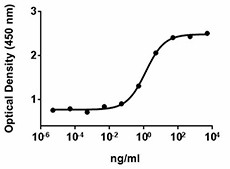
-

Induction of IL-6 in mouse myeloid leukemia M1 cells by human FLT3L. -

Recombinant human FLT3L induces IL‐6 production in murine myeloid leukemia cell line M1 in a dose dependent manner in the presence of 1 ng/mL of mouse LIF recombinant protein. BioLegend’s product was compared side‐by‐side to the leading competitor's equivalent product.
Human FLT3L was initially cloned from a T cell cDNA library using a mouse probe; the human and mouse FLT3L proteins share 72% amino acid identity. FLT3L is synthesized as a type I membrane-bound protein, which is cleaved to become a soluble growth factor. Additionally, a soluble form of FLT3L has been reported as a result of alternative splicing. TACE (ADAM17) plays a key role in the ectodomain shedding of FLT3L; in fact, serum FLT3L levels are decreased in TACE deficient mice. FLT3L is crucial for the development of the two main subsets of dendritic cells (DCs): conventional DCs (cDCs) and plasmacytoid DCs (pDCs). Changes in development or the number of DCs can alter T cell immunity and tolerance. A feedback loop between DCs and Tregs is regulated via FLT3L, as it has been shown that the increase in Tregs induced by DC expansion delays the onset of type 1 autoimmune diabetes and IBD in mice. Also, FLT3L facilitates formation of Tregs and thus, reduces severity of antigen-induced arthritis in mice. FLT3L is elevated in the synovial fluid of rheumatoid arthritis (RA) patients and FLT3L has been included in panels of preclinical markers for predicting the possible development of RA. The innate sensing pathway triggered by Plasmodium infection regulates DC homeostasis and adaptive immunity via FLT3L release. High levels of FLT3L and increased DCs have been detected in humans and mice during Plasmodium infection.
Product DetailsProduct Details
- Source
- Human FLT3L, amino acids (Thr27-Pro185) (Accession# U04806), was expressed in CHO cells.
- Molecular Mass
- The 159 amino acid recombinant protein has a predicted molecular mass of approximately 18 kD. The DTT-reduced and non-reduced protein migrate at approximately 23-33 kD and 20-30 kD by SDS-PAGE. The N-terminal amino acid is Thr.
- Purity
- >95%, as determined by Coomassie stained SDS-PAGE.
- Formulation
- 0.22 µm filtered protein solution is in PBS, pH 7.2.
- Endotoxin Level
- Less than 0.01 ng per µg cytokine as determined by the LAL method.
- Concentration
- 10 and 25 µg sizes are bottled at 200 µg/mL. 100 µg size and larger sizes are lot-specific and bottled at the concentration indicated on the vial. To obtain lot-specific concentration and expiration, please enter the lot number in our Certificate of Analysis online tool.
- Storage & Handling
- Unopened vial can be stored between 2°C and 8°C for up to 2 weeks, at -20°C for up to six months, or at -70°C or colder until the expiration date. For maximum results, quick spin vial prior to opening. The protein can be aliquoted and stored at -20°C or colder. Stock solutions can also be prepared at 50 - 100 µg/mL in appropriate sterile buffer, carrier protein such as 0.2 - 1% BSA or HSA can be added when preparing the stock solution. Aliquots can be stored between 2°C and 8°C for up to one week and stored at -20°C or colder for up to 3 months. Avoid repeated freeze/thaw cycles.
- Activity
- ED50 = 1.0 - 6.0 ng/ml, corresponding to a specific activity of 0.16 - 1.0 x 106 units/mg, as determined by induction of IL-6 production in mouse myeloid leukemia M1 cells.
- Application
-
Bioassay
- Application Notes
-
BioLegend carrier-free recombinant proteins provided in liquid format are shipped on blue-ice. Our comparison testing data indicates that when handled and stored as recommended, the liquid format has equal or better stability and shelf-life compared to commercially available lyophilized proteins after reconstitution. Our liquid proteins are verified in-house to maintain activity after shipping on blue ice and are backed by our 100% satisfaction guarantee. If you have any concerns, contact us at tech@biolegend.com.
- Product Citations
-
Antigen Details
- Distribution
-
Thymic stromal cells, mast cells.
- Function
- FLT3L stimulates the proliferation of hematopoietic precursors and development of natural killer cells and dendritic cells. FLT3L regulates the homeostatic feedback loop between DCs and Tregs. FcεRI-triggered mast cell degranulation induces an increase of FLT3L in serum.
- Interaction
- Hematopoietic stem progenitor cells, progenitor cells, NK cells, and DCs.
- Ligand/Receptor
- RTK Fms-like tyrosine kinase 3 (FLT3).
- Bioactivity
- Induction of IL-6 on M cells.
- Cell Type
- Embryonic Stem Cells, Hematopoietic stem and progenitors
- Biology Area
- Stem Cells
- Molecular Family
- Cytokines/Chemokines, Growth Factors
- Antigen References
-
1. Hannum C, et al. 1994. Nature 368:643.
2. Waskow C. 2008 Nat. Immunol. 9:676.
3. Darrasse-Jèse G, et al. 2009. J. Exp. Med. 206:1853.
4. Horiuchi K, et al. 2009. J. Immunol. 182:7408.
5. Svensson MN, et al. 2013. PLoS One 8:e54884.
6. Guermonprez P, et al. 2013. Nat. Med. 19:730. - Gene ID
- 483845 View all products for this Gene ID
- Specificity (DOES NOT SHOW ON TDS):
- FLT3L
- Specificity Alt (DOES NOT SHOW ON TDS):
- FLT3L
- App Abbreviation (DOES NOT SHOW ON TDS):
- BA
- Hidden Names (DOES NOT SHOW ON TDS):
- FLT3
- UniProt
- View information about FLT3L on UniProt.org
Related FAQs
- Why choose BioLegend recombinant proteins?
-
• Each lot of product is quality-tested for bioactivity as indicated on the data sheet.
• Greater than 95% Purity or higher, tested on every lot of product.
• 100% Satisfaction Guarantee for quality performance, stability, and consistency.
• Ready-to-use liquid format saves time and reduces challenges associated with reconstitution.
• Bulk and customization available. Contact us.
• Learn more about our Recombinant Proteins. - How does the activity of your recombinant proteins compare to competitors?
-
We quality control each and every lot of recombinant protein. Not only do we check its bioactivity, but we also compare it against other commercially available recombinant proteins. We make sure each recombinant protein’s activity is at least as good as or better than the competition’s. In order to provide you with the best possible product, we ensure that our testing process is rigorous and thorough. If you’re curious and eager to make the switch to BioLegend recombinants, contact your sales representative today!
- What is the specific activity or ED50 of my recombinant protein?
-
The specific activity range of the protein is indicated on the product datasheets. Because the exact activity values on a per unit basis can largely fluctuate depending on a number of factors, including the nature of the assay, cell density, age of cells/passage number, culture media used, and end user technique, the specific activity is best defined as a range and we guarantee the specific activity of all our lots will be within the range indicated on the datasheet. Please note this only applies to recombinants labeled for use in bioassays. ELISA standard recombinant proteins are not recommended for bioassay usage as they are not tested for these applications.
- Have your recombinants been tested for stability?
-
Our testing shows that the recombinant proteins are able to withstand room temperature for a week without losing activity. In addition the recombinant proteins were also found to withstand four cycles of freeze and thaw without losing activity.
- Does specific activity of a recombinant protein vary between lots?
-
Specific activity will vary for each lot and for the type of experiment that is done to validate it, but all passed lots will have activity within the established ED50 range for the product and we guarantee that our products will have lot-to-lot consistency. Please conduct an experiment-specific validation to find the optimal ED50 for your system.
- How do you convert activity as an ED50 in ng/ml to a specific activity in Units/mg?
-
Use formula Specific activity (Units/mg) = 10^6/ ED50 (ng/mL)
 Login / Register
Login / Register 







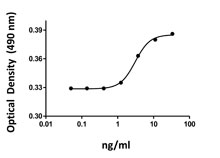
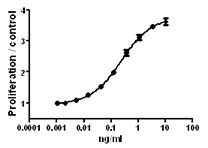
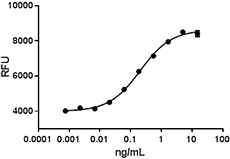
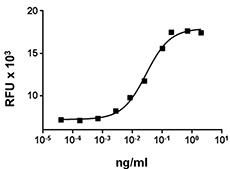



Follow Us